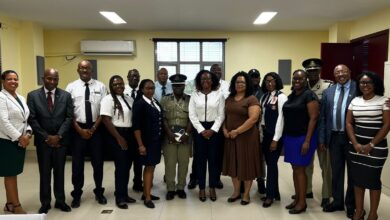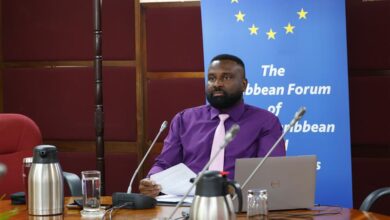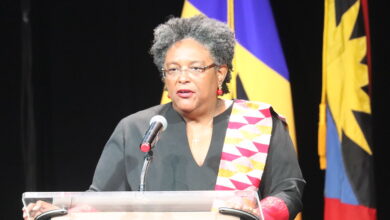|
I bring you greetings on behalf of the Secretary-General and staff of the Caribbean Community Secretariat. This is indeed an important event for Belize and for the Region as a whole as the Consultation today is part of a process leading up to a discussion at a regional dialogue between Civil Society and the Heads of Government of the Caribbean Community (CARICOM) in the Forward Together Conference to be held in Barbados 13 – 14 November 2001. Similar consultations are ongoing in other countries throughout the Caribbean. Our consultations have arisen as a result of a mandate from the Heads of Government at it Conference held in Canouan in St. Vincent in July 2000. Our Heads were challenged by the continued expression by the Youth, the social partners including labour, the business community and the NGOs . All these entities felt that they were left out of the policy making framework, more or less, that they did not comprehend the benefits of the movement toward the Caribbean Single Market and Economy (CSME). They also felt by passed in the decisions on the Community that would affect their daily lives and sustainable livelihood. These feelings of apprehension and at times alienation are understandable in the context of the rapid changes in the Global Economy to which Caribbean policy makers are forced to respond instantly and rapidly. The trends in globalization and liberalization are creating a paradigm shift, and in particular, the Caribbean Secretariat. Subsidies for our sugar and bananas and for example other traditional exports can no longer hope for protection. In addition CARICOM countries can no longer depend on maintaining traditional exports as the main source of revenue as they used to in Europe and North America. And, over the past five years CARICOM exports to the European Union have gone down in value as the region continues to decline in relative importance to that market. The region's performance in the other main market the USA is even worse. It is really to avoid the worse effects on the individual small fragile economies that the acceleration of the process toward a Caribbean Single Market and Economy is taking place. It involves the establishment of an integrated CARICOM industrial programming scheme, a more cohesive system for the movement of capital, the intensification of monetary cooperation, action to develop a regional system of air and sea transportation, and the free movement of skilled labour and other professional personnel. The main thrust of this process is to make the regional economy more viable in the face of global competition, and, in this context, Belize is uniquely at the gateway between the Caribbean and Central America. In establishing the basis therefore for this viable Caribbean Economy, CARICOM has had to review its procedures and to ensure that its Member States develop common policies to facilitate the free movement of goods, services, capital and people. These include negotiations on nine protocols that would form the legal basis and the regulations by which the CSME would function effectively. Much has changed since the days of CARIFTA in 1973 when the Community was mainly concerned with establishing a Free Trade Area. Among the main institutional responses is the Caribbean Court of Justice, which will be responsible for arbitration of trade, disputes among Countries as well as being a Court of Final Appeal. The establishment of the Regional Negotiating machinery (RNM) which was in effect from1997 to coordinate the Community's external negotiations. Indeed, this was necessity by the prominence of the Free Trade Agreement of the Americas (FTAA), the Post Lome IV, ACP-EU relations, and the World Trade Organisation negotiations. Contrary to many statements in the press the CARICOM process has made an effort to consult with constituency groups and to involve partners in the framing of policies on the CSME. In issues involving the Council on Trade and Economics Development (COTED), comprising Ministers of Trade and other National Officials, the private sector throughout the region continues to be consulted and to participate in its deliberations. In the establishment of the CCJ, the legal profession and other relevant groups have been consulted and their views taken into consideration in modifying the implementation strategies. In dealing with issues related to the free movement of labour in the CSME various stakeholders, the teaching profession, the labour movement and the employers' associations have all been involved together with the national Customs Officers and Immigration Officials. More recently, the CARICOM Community has sought to provide a more hands on role for the Prime Ministers in the guidance of policies related to the various sectors by creating a quasi Cabinet. In this system, Prime Ministers have responsibility for various regional Portfolios. In this example, Belize has the function for Sustainable Development including Environment and Disaster Management, Jamaica, External Negotiations, Barbados, the CARICOM Single Market and Economy (CSME), St. Kitts and Nevis, Health, Grenada, Science and Technology, The Bahamas, Tourism, Antigua and Barbuda, Services, Guyana, Agriculture, Trinidad and Tobago, Security, Haiti, Transportation, Dominica, Labour, Suriname, Community Development and Cultural Cooperation, Saint Lucia, Justice and Governance, and St. Vincent and the Grenadines, Bananas. Only November last year did the Assembly of Caribbean Community Parliamentarians (ACCP) met in Belize to discuss a cross section of relevant regional issues including HIV/AIDS. The ACCP is comprised of both Government and Opposition members of Parliament and is a very unique institution in an every growing quest on the part of CARICOM to broaden the basis of consultation and intervention into the policy process. It gives me great pleasure to note that one of the stalwarts in this process of integration has been the Rt. Hon. George Price for whom we hold deepest affection and on whom the Heads of Government have conferred the Region's highest honour, the Order of the Caribbean Community. It only brings me ladies and gentlemen, that this Consultation of Civil Society in Belize is another attempt that is being made be CARICOM to improve its system of governance and thereby make this Caribbean region more coherent, transparent and participative.
On the eve of the Carnival and Independence celebrations, the Secretary-General and our own Deputy Secretary-General Dr. Carla Barnett who hails from Belize, and all other members of the CARICOM Secretariat join me in extending to the Government and People of Belize, warmest congratulations and wishes toward fostering Regional Integration and relationships within this family of the Community. |
|
|
|
Press ReleasesSpeeches





